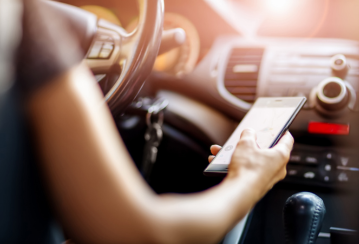News and Updates
Understanding distracted driving in Ontario
Distracted driving is one of the biggest threats to Canadians’ safety on the road. Although sending or reading a text while driving may not seem risky to some drivers, the National Highway Traffic Safety Administration (NHTSA) reveals that taking your eyes off the road for just 5 seconds at 90 km/h is comparable to driving the length of an entire football field with your eyes closed. In truth, fatalities caused by distracted driving have exceeded those caused by impaired driving in some parts of Canada1. That’s why every province and territory has distracted driving-related laws to discourage drivers from using hand-held devices when behind the wheel.
Safe driving isn’t just a responsibility; it’s a necessity for everyone’s well-being. Here’s what you need to know about distracted driving, the associated penalties, and tips to avoid this dangerous habit.
What counts as distracted driving?
In Ontario, distracted driving laws shouldn't be taken lightly. They apply to using hand-held devices for texting, dialing (except to call 911 in an emergency), emailing, searching directions (except by voice commands), watching videos, etc., while driving, even when you're stopped in traffic or at a red light.
While using a hands-free wireless communications device, voice commands, a built-in display screen, or a mounted GPS is allowed, it's important to know that they can still pose significant risks. Research has found that these options can be just as, if not more, distracting to drivers due to system errors, the time it takes to complete an action and the intuitiveness of the devices2. Any form of distraction can lead to accidents on the road.
Other activities like eating, drinking, grooming, smoking/vaping, reading, and reaching for items aren't part of Ontario's distracted driving laws, but you can still face careless or dangerous driving charges. So, even if you're not using a hand-held device, beware of the legal consequences of these actions.
Distracted driving statistics3
-
47% of Canadians admit that they’ve typed out or used a voice memo to send a message while driving.
-
Using a phone while driving leads to 1.6 million collisions annually.
-
94% of teenage drivers acknowledge the risks of texting and driving, but 35% of them admit that they still do it.
-
Driving distracted makes you eight times more likely to be involved in a collision.
-
Talking on a phone while driving makes you four times more likely to be involved in a collision.
Penalties for distracted driving
If convicted of distracted driving, the penalty you face depends on the type of licence you hold and how long you’ve been driving4.
G licence drivers with a first conviction can expect:
-
A $615 fine, if everything is settled out of court.
-
A $1,000 fine if you receive a summons or if you fight the ticket in court and lose.
-
3 demerit points added to your driving record.
-
A 3-day licence suspension.
G licence drivers with a second conviction can expect:
-
A $615 fine, if everything is settled out of court.
-
A $2,000 fine if you receive a summons or if you fight the ticket in court and lose.
-
3 demerit points added to your driving record.
-
A 7-day licence suspension.
G licence drivers with a third conviction (and any further convictions) can expect:
-
A $615 fine, if everything is settled out of court.
-
A $3,000 fine if you receive a summons or if you fight the ticket in court and lose.
-
6 demerit points added to your driving record.
-
A 30-day licence suspension.
Novice drivers holding a G1, G2, M1, or M2 licence can be convicted of distracted driving but won’t receive any demerit points. Instead, they can expect:
-
For a first conviction, a 30-day licence suspension.
-
For a second conviction, a 90-day licence suspension.
-
For a third conviction, your licence will be cancelled, and you’ll be removed from the Graduated Licensing System (GLS). To get your licence back, you’d have to redo the GLS program.
Tips to avoid distracted driving
-
Turn off your phone, switch it to ‘Silent Mode,’ or turn on the ‘Do Not Disturb’ feature before entering your vehicle.
-
If you feel it’ll still be distracting, put your phone in your glove compartment or the back seat.
-
Prepare a playlist and play it before you start driving, or ask a passenger to be the DJ.
-
Adjust your seat and climate controls before hitting the road.
-
Program your destination into your GPS before you depart.
-
Don’t eat while you’re on the go.
-
If something falls, leave it or pull over safely to move it.
-
Ask a passenger to take a call or respond to a text for you.
-
If a call or text can’t wait, pull over safely to take it or respond.
If you're a current OTIP policyholder, contact us at 1-833-615-9329 to review your existing auto insurance policy. If you’re not insured with OTIP and are shopping for auto insurance, call us at 1-833-494-0085 to get a quote and receive a $20 gift card of your choice!







